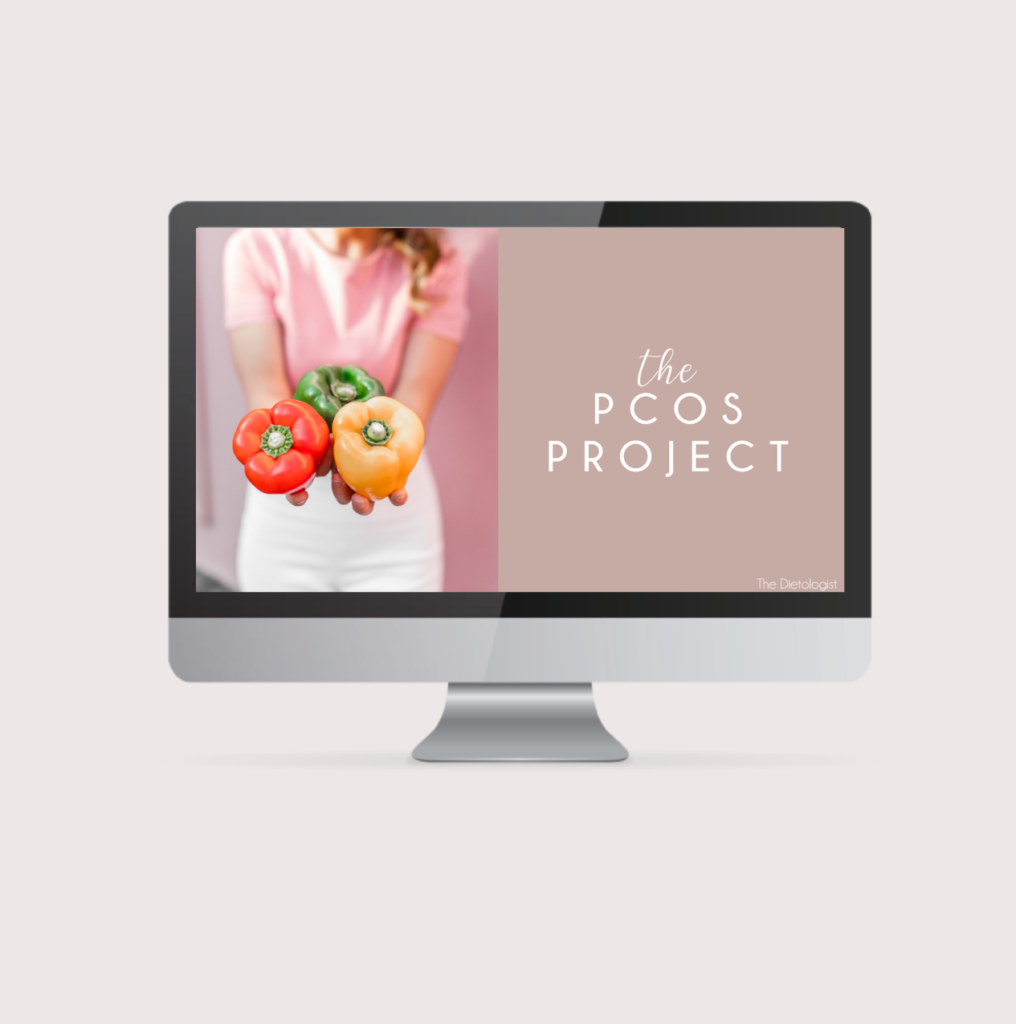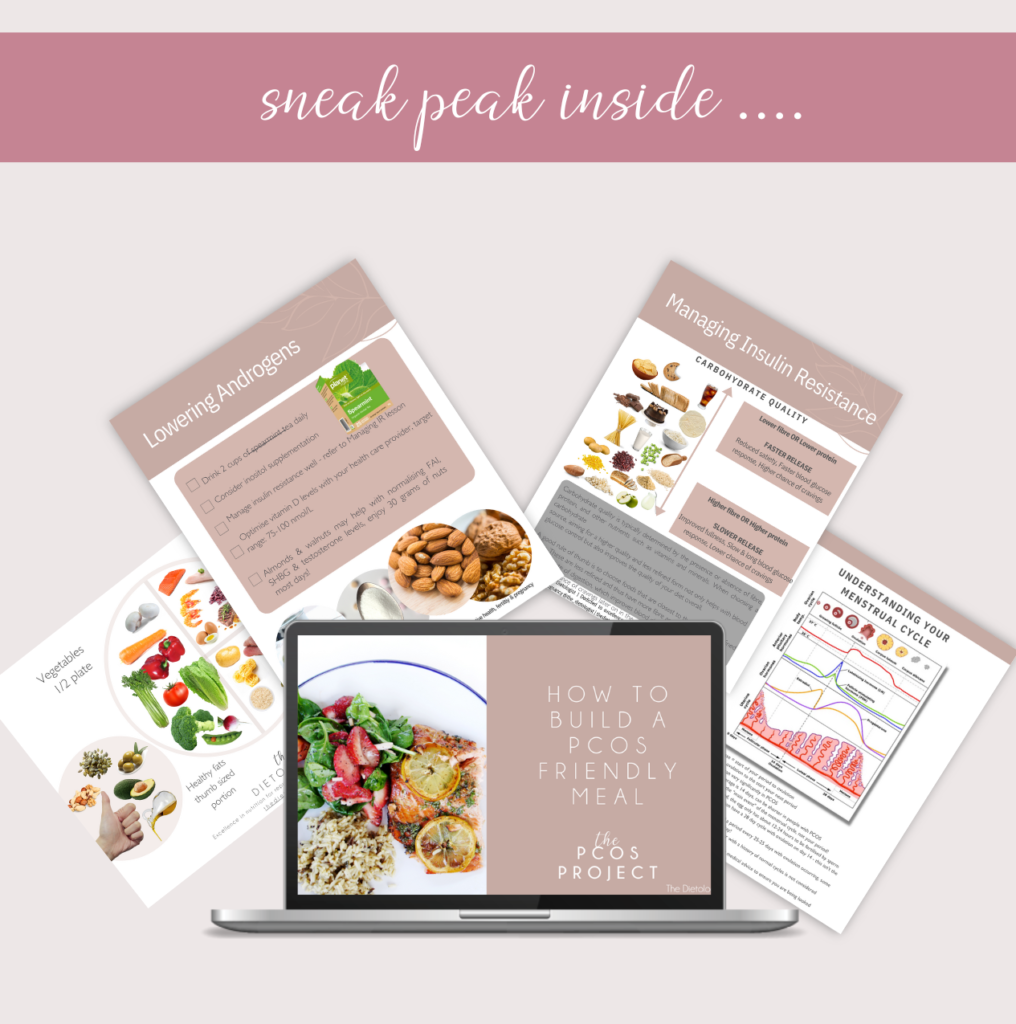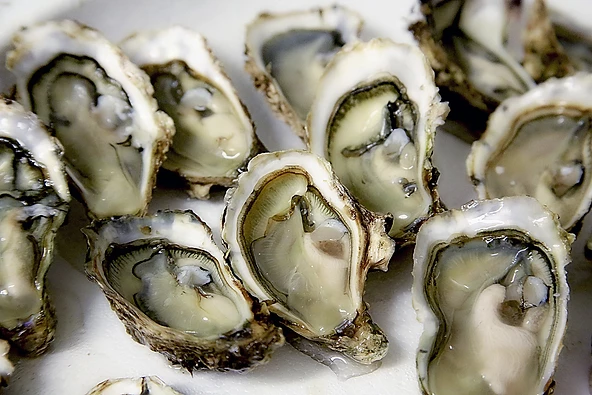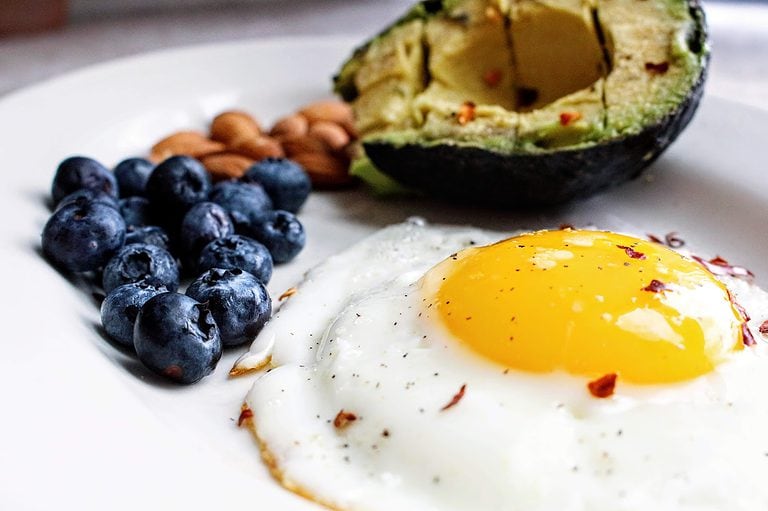After everyone loving on my eating for endometriosis blog last week, I thought I’d continue this mini-series about nutrition for different women’s health conditions. And next on my list is PCOS or Polycystic Ovarian Syndrome is the next on my list!
PCOS affects 12-18% of women of reproductive age and up to 21% in some high-risk groups, such as Indigenous women (Jean Hailles), which is 1 in 5 to 8 women living with this condition! With 70% of women with the condition estimated to remain undiagnosed!
What is PCOS?
Polycystic Ovarian Syndrome is a hormonal disorder which can present as a combination of the following symptoms:
- Irregular or infrequent menstruation
- Lack of ovulation
- Skin changes, specifically acne & darkening of the skin
- Hair changes, specifically excessive hair growth and/or hair loss
- Weight gain
- Increased anxiety and depression
- May have multiple ‘cysts’ (or partially formed follicles/eggs) on the ovaries, but not present for all women
- Difficulty becoming pregnant
- Sleep apnoea
Women with PCOS may have trouble falling pregnant due to hormone dysregulation, specifically high androgens affecting 60-80% of women with PCOS, also contributing to the excessive hair growth and raised insulin levels. This goes onto affect both menstruation and ovulation, either by completely or reducing the frequency of regular ovulation.
PCOS is often associated with insulin resistance. Insulin, the hormone responsible from moving sugar (glucose) from your blood into your cells. Insulin resistance means the hormone is getting less and less effective at doing its job, leading to more insulin being produced by the pancreas and rising blood glucose levels. Women with PCOS have an increased risk of developing type 2 diabetes, therefore lifestyle management in conjunction with any medical management is needed.
Extra facts about PCOS:
- Not all women with PCOS have insulin resistance (85% of women with PCOS also have insulin resistance).
- Not all women with PCOS are overweight (again about 85% of women with PCOS), regardless of body size, they’re equally affected by menstrual dysregulation.
Nutrition & PCOS
The truth is, research shows that no dietary pattern is known to be the “best” for helping to manage PCOS. All about finding what’s right for you with the guidance of a health professional. There is no one diet proven to help PCOS
Here are some potential dietary pattern options that may help with managing PCOS, these should be individualised to each woman in conjunction with your health professional to work out what works best for your body, life & needs.
(1) Lower GI Carbohydrates
Low GI carbohydrate foods are those that slowly release glucose (the product of carbohydrate breakdown) into your blood stream, this prevents rapid spikes in your blood sugars and therefore your insulin is more likely to keep up with the glucose load entering your body.
A few simple low GI swaps include:
- Swapping white Jasmine rice for Brown Basmati Rice or Clever Doongara Rice
- Swapping your afternoon cracker snack with nuts & seeds
- Swapping a white potato for sweet potato
- Swapping a chocolate bar for a hot chocolate (the milk will slow down the release of glucose into your blood stream)
- Swapping white bread for a grainy wholemeal, rye or sourdough variety

(2) Lowering Carbohydrates
You know me, I love me some carbs.
But, too much of a good thing (yes, even beloved carbs) can have a negative consequence on health.
Whilst GI is important to consider if you have PCOS, the portion of the carbohydrate food is just as important to helping manage insulin resistance. For example, instead of having 2 pieces of toast in the morning, switch to 1 slice and add an egg to keep you fuller for longer.

Reducing high GI, refined or highly processed sources of carbohydrates is a good idea from a weight management and blood glucose management perspective, as these foods tend to not satisfy and leave you coming back for more.
Sticking to fibrous wholegrains throughout the day will keep you fuller for longer because of their satiating fibre. It’s best not to bunch all your carbohydrates in together, for example, eggs and veggies for breakfast, tuna salad for lunch and pizza for dinner. See how the carbs are all bunched in at night time? Instead, it’s best to have smaller amounts throughout the day, especially if you have insulin resistance.
I have seen women (on social media) going keto for PCOS, I always think about the sustainability of this type of dietary pattern as well as other potential health consequences. PCOS is not going “go away” anytime soon as there’s no cure (yet!), your dietary pattern should be able to be maintained for the next 12 months and BEYOND …like forever)!
One small study showed that women with higher protein intake had an improvement in glucose metabolism. Considering increasing protein to promote fullness anyway, so this may be an added bonus, however, we’re yet to FULLY understand its role in PCOS!
(3) Mediterranean Diet
The Mediterranean diet heralded for its heart-healthy, fertility-promoting and brain-friendly benefits, is also appropriate for women with PCOS.

I’ve spoken about this dietary pattern before, however a quick run-down, the dietary pattern compromises of:
- Extra Virgin Olive Oil (EVOO)
- Plenty of vegetables
- Fruit
- Legumes & lentils
- Plenty of seafood
- Wholegrains
- Nuts & seeds
- Moderate amounts of poultry, red meat, eggs
- Moderate amounts of fermented dairy (yoghurt & cheeses)
If you’re trying to fall pregnant and you’re living with PCOS, this may be a great dietary pattern to follow as it promotes lots of omega-3 fats and monounsaturated fats, as well as an overall “anti-inflammatory” style of eating with antioxidants from fruits, veggies and high-quality EVOO, helping to keep your eggs in tip-top shape!
If you’re trying to manage mental health issues alongside PCOS, this may also be a great dietary pattern to use alongside any other treatments you’re receiving from your doctor or mental health professional. As the Mediterranean diet showing benefits for depression, as well as anxiety (Jacka et al., 2017). One size does not fit all, seek professional advice to tailor your nutrition to your needs
Feeling overwhelmed by all of the above?
Start with 3 simple changes that benefits pretty much each and every person:
- Drink water.
- Eat some fruit, everyday, choose what’s in season (2 pieces such as a banana & an apple, at different times of the day).
- Eat some more non-starchy veggies, add an extra side salad to your meal, fill half your plate with veggies, buy a pre-made slaw from the supermarket (ditch the dressing, yo, make your own, it’s totally worth it).

Exercise & PCOS
We know that any form of exercise improves our insulin sensitivity, therefore being active regularly can help you not only shift any extra weight but also make your body more sensitive to the insulin already being produced.
One study showed a brisk walking programme for women with PCOS also had psychological benefits, which should definitely be incorporated into any lifestyle modification. As we know women with PCOS are at an increased risk of mental health concerns, using exercise to manage stress and promote mental wellbeing is a great way to help manage this complex condition.

Have you been diagnosed with PCOS? Take control of your PCOS rather than letting it take control of you!
Introducing…The PCOS Project

This self-paced online course has been developed to highlight the role of diet and nutrition in managing your PCOS symptoms and taking control of the rollercoaster that is PCOS with 10 comprehensive PCOS-specific nutrition lessons. We also include BONUS PCOS-friendly 7-day meal plans and recipes! Check it out ?

What you’ll get inside The PCOS Project:
- Over 10 comprehensive PCOS-specific nutrition lessons designed & delivered by expert reproductive health dietitian & nutritionist
- Learn exactly what bloodwork you need to monitor your PCOS today and in the long-term too!
- Take control of insulin resistance and stubborn weight using the insulin resistance lesson & comprehensive workbook
- Our strategies to lower androgens driving those pesky pimples & chin hairs!
- Understand your menstrual cycle, the ways you can track it, what the “red flags” are for more help and how to nourish yourself for more regular periods!
- PLUS: supplementation considerations for PCOS (note: does not include personalised supplementary advice), mood & food for mental health, anti-inflammatory eating for PCOS, optimising gut health & how to build a PCOS-friendly meal
BONUS: PCOS-friendly done-for-you 7-day meal plans with recipes AND additional recipe resources!
You will get 2 YEARS to access this incredible VAULT of expertly crafted & delivered PCOS education.
Ensure that you get the support you need when changing your dietary pattern from an Accredited Practising Dietitian, to prevent any nutrient deficiencies and tailor it to your needs & goals!







